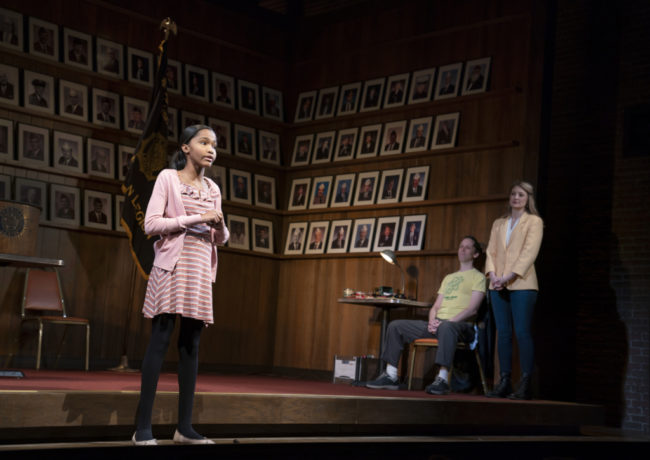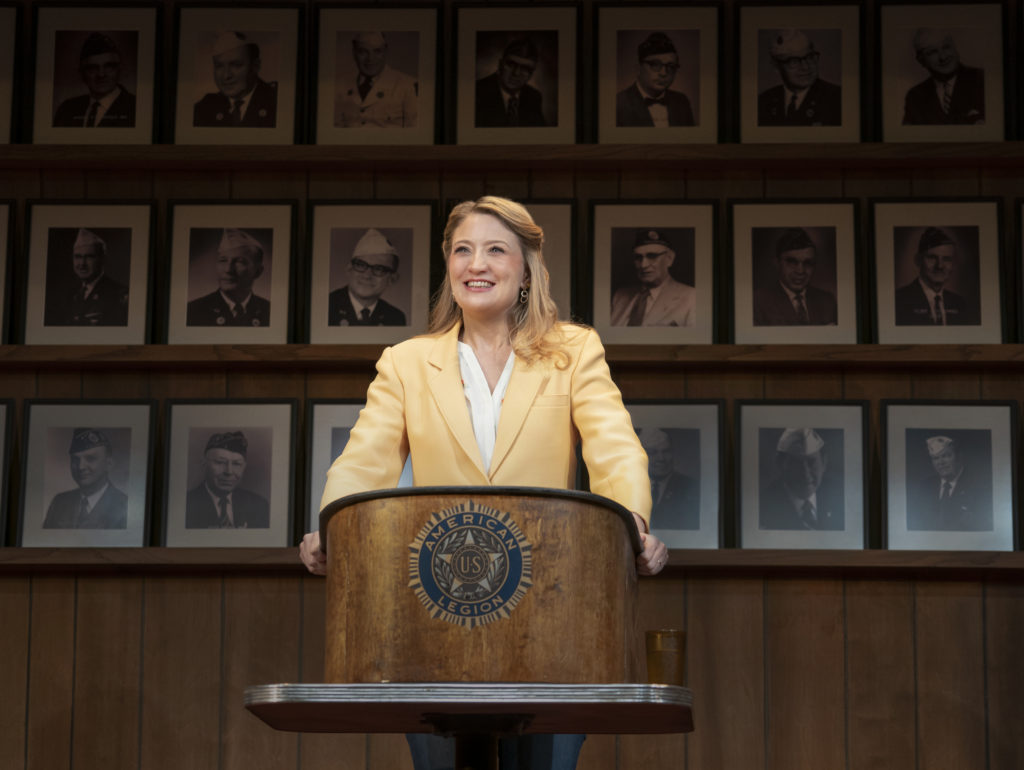Like the play being revieweditself, this review is by necessity going to be different. No cute opening paragraph. No clever parallels. No history lesson to set the stage. Let me start right out by saying that in 2019, this play couldn’t be more important. After two off-Broadway incarnations and a Tony-nominated Broadway debut last spring (winning the Obie Award for best new American play, the New York Drama Critic’s Circle for best American play, and the Off-Broadway Alliance Award for best new play as well as a Pulitzer nomination along the way), Heidi Schreck’s What the Constitution Means to Me, starring Schreck and flawlessly directed by Oliver Butler, sets up a limited engagement at the Kennedy Center before heading west to Los Angeles. In an age where we have become disillusioned to appalled by our self-serving heads of state, when the gap between the top 1% and the pitiful 99 below them widens exponentially by the hour, when big money corporations own our government, our bodies, and our health, Schreck takes us on a captivating 105 minute tour of the document that has provided the licensing to execute all of the above. We quickly intuit her lesson is also going to be very different. Judging from the audience’s reaction, in a house significantly bigger than any it played in New York, it could be possible that this is the rare piece of theatre that plays better out of town, and DC in particular, a town held hostage by those who manipulate the titular document to their best advantage, is perhaps the perfect landing for this show to blossom into full potential.

We find out in a soft open as Schreck addresses the audience, explaining her lifelong fascination with the Constitution, that as a high school student she raised her entire college tuition by winning prize money on the lodge circuit giving speeches and participating in debates about the document. Pointing out Rachel Hauck’s generic legion hall set and podium, she proceeds to take us on the journey where she started at 15 and how her understanding of the Constitution impacted her life and vice versa.
Cast member Mike Iveson sits in as generic legionnaire/moderator (ridiculously yet realistically costumed by Michael Krass down to the bejeweled fez in the only real character costume of the evening, everything else being carefully selected, flattering street-ware) who aids the recreation of her lodge-hall years as the 47-year-old Schreck once again becomes 15 and, in the mandatory “make a personal connection” coaching of the event, recreates her speech hilariously likening the Constitution to a witch’s cauldron which brews the ingredients you put into it (she was into witchcraft and the Salem trials, her nemesis on the circuit did her speech on the Constitution as a patchwork quilt).
After guiding us through the standard debate format, a 7-minute presentation with a focus on one amendment of choice (she chose the 9th, which basically guarantees that the rich old white men who wrote the document would always retain all their outlined rights while obliterating all those of the Native Americans they unseated, no matter what rights anyone [insert “black” or “female”, who were not even granted protection under the document until the 15th and 19th amendments respectively] acquired in the future), followed by a cold question about an amendment drawn from random (she draws the 14th, and gives an impassioned assessment of the citizenship implications outlined there).
At this point, Schreck steps out of the pageantry, strips off her cheery buttercream blazer, and begins to digress as herself on how these articles have shaped the events of the world and particularly of her family. She movingly blends episodes of ridiculous humor with heartbreaking stories of how the basic rights of her matriarchy were obliterated under the Constitution. Included are the adventures of her great-grandmother, a mail-order bride from Germany who died after being institutionalized for “melancholia”, an abusive step-grandfather who traumatized two generations of women, and introduction to the internal and external implications of abortion. She also features a chilling segment on the landmark supreme court case of Jessica Gonzalez, who sued the police force of Castle Rock, CO, for not upholding a restraining order against her estranged husband to disastrous ends.
Schreck gives a much-deserved Tony-nominated performance here. Part stand-up comedy, part lecture, part performance art, she, under Butler’s expert guidance, traverses between all three artforms fluidly, hilariously, and in the end achingly in how this document has failed so many it pretends to protect. She also deserves incredible credit for presenting essentially the ultimate feminist stance against the document and the society it has created without attacking, belittling, or mocking men in the process.

To close the evening, 14-year-old cast member Rosdely Ciprian, an articulate African-American high school student from New York, joins Schreck in a mock debate of the question on whether to keep or abolish the constitution, positions determined by the flip of a coin. (Schreck points out the irony that the two women onstage debating the document were not even included in its protection until 100-150 years after it was written and ratified.) At this performance, Schreck drew “Abolish”, and based her argument on the fact that the Constitution isn’t defective, it works perfectly as it was designed—to maintain that the rich old white men who it was written for would always maintain their rights and their power. She quotes Thomas Jefferson who feared that it would outdate itself as the world changed and favored each future generation after his should draft its own relevant Constitution. The vibrant and eloquent Ciprian countered that though the document is indeed flawed, it is a better tool to use to change the country from within. It would be interesting to see the flip side of their arguments on nights when the draw is different.
Like the title of the show itself, a salute to old-fashioned school themed essay contests, Schreck and Butler have crafted an evening that is deceptively more complex than it looks on the surface. Starting with the soft opening where Schreck takes the stage appearing to address the audience in an apparent preshow with the house lights still on to give some background about herself and her lifelong passion for the Constitution. It isn’t until Iveson enters through the audience as the lodge monitor that we realize the play has been in progress all along. Houck’s set is deceptively simple. Seemingly just a generic, wood-paneled American Legion hall, displaying hundreds of famed pictures of past grand commanders, we come to see it means that Schreck is telling her story under the gaze of hundreds of the same affluent old white men who have enjoyed while denying others in her tale their same basic rights. Humor and stand-up comedy evolve into heartbreaking pathos. Even its underlying incredibly feminist stance sneaks up on the audience because it is devoid of the requisite heavy-handed male-bashing all others envelop it in (the best way to get the message to those who need to hear it the most). Lines are so beautifully blurred it’s hard to see where the reactions of Schreck the performer ends and Schreck the human reliving her own tale begins (particularly moving is the section where she has difficulty reconciling the persona of the grandmother she adored with the actions of a woman who, devoid of rights, tolerated her husband’s atrocities against her and her daughters), or where the script of the nightly debate overlaps with the improvisation of the participants giving their empowered speeches. But mostly, it is that rare very important piece of theatre that deceives us on how important it really is because it never proclaims itself to be such, as most “important” artworks do, bombastically.
Schreck’s message has never been more necessary in our lifetime. Our political machine is in shambles and our leaders have sold us out. Everyone feels threatened by the loss of their basic rights—to guns, to citizenship, to their livelihood, to their bodies, to their health, to their medical choices—there is something for everyone to take away in better understanding our country and ourselves. Don’t miss this special evening of theatre that has the potential to change minds, hearts, and futures. Just go.
Running Time: Approximately 1 hour and 45 minutes with no intermission
What the Constitution Means to Me currently plays through September 22, 2019 in the Eisenhower Theatre at the John F. Kennedy Center for the Performing Arts, 2700 F Street NW, Washington, DC. For tickets call the box office at (202) 467-4600 or purchase them online.

